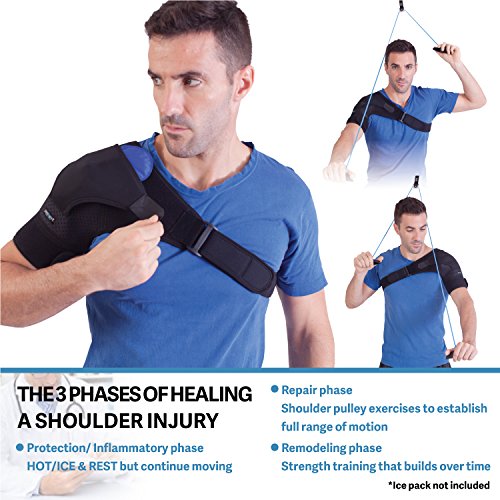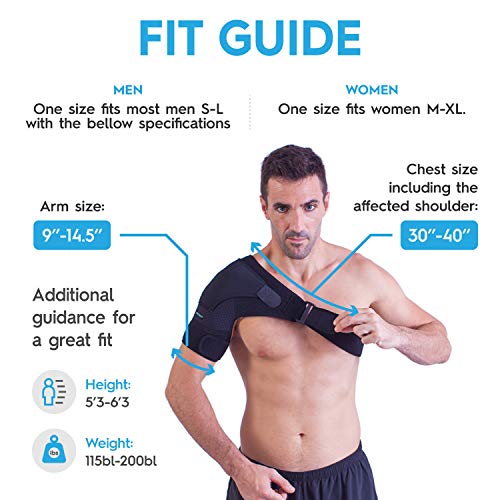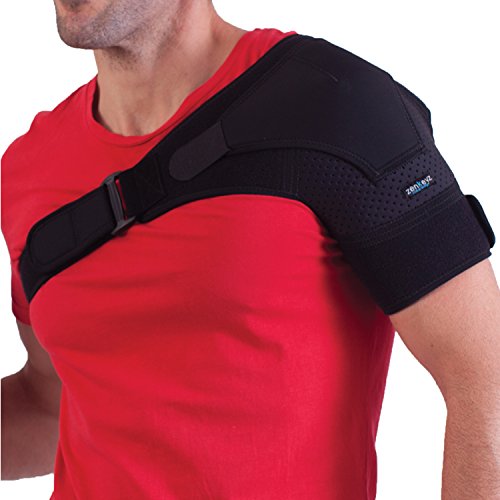If you’re a professional swimmer who trains all day and all night, or simply an avid pool plunger who engages in this aquatic activity to stay fit, you may have experienced pain somewhere in your upper back and shoulder region that just doesn’t seem to go away.
If so, there is a pretty good chance you have the ultimate swimmer’s scourge: Swimmer’s Shoulder.
Also called Shoulder Impingement Syndrome, this can be a painful, debilitating issue that may prevent you from hopping into the pool ever again, only if you don’t know how to help fight it, that is.
That’s why we’ve created this Ultimate Guide to Swimmer’s Shoulder; we wanted to provide you with all of the important information you’ll need as a swimmer so you can prevent, recognize, and ease this pain.
First, we’ll briefly discuss exactly what Swimmer’s Shoulder is. Then, we’ll break down potential risk factors, causes, and symptoms so you know what to look out for. And finally, we’ll provide you with possible methods of prevention and treatment to make sure you can get back into the water in no time!
Does that sound good to you? If so, let’s dive right in (see what I did there?)!
What Is Swimmer’s Shoulder?
According to the North American Journal of Sports Physical Therapy, “Swimmer’s Shoulder is a musculoskeletal condition that results in symptoms in the area of the anterior lateral aspect of the shoulder, sometimes confined to the sub acromial region.”
In layman’s terms, it’s really bad shoulder troubles that you’ll feel in the front and sides of your shoulders. And their research actually shows that nearly ⅓ of frequent swimmers experience this painful problem.
But, of course, there is always a chance that you don’t have Swimmer’s Shoulder, and you merely have generic shoulder pain or a pulled muscle. To prevent any misinformation, make sure to check first with your doctor before trying to treat it on your own.
That being said, it’s certainly not too early to at least _learn _about Swimmer’s Shoulder – or to learn more about it if you know you do have it – so we’ve compiled all the information you swimmers out there need to know about this painful problem!
Who Can Get Swimmer’s Shoulder?
You may be surprised to know that something named after swimmers can actually be experienced by anyone else. But, you better believe it, because it’s true!
Due to similar rotation of the shoulder muscles and joints, Swimmer’s Shoulder can also be found in tennis players and baseball or softball players, according to a medically reviewed report by Healthline. When you think about the similar movements, it certainly makes sense.
Additionally, Swimmer’s Shoulder can be experienced by movers, warehouse workers, construction workers, and even painters! So, if you find yourself in any of these lines of work or hobbies, make sure to follow the preventative measures discussed later in this article.
What Causes Swimmer’s Shoulder?
As is the root cause of many athletic injuries, Swimmer’s Shoulder usually arises from a mistake made by the swimmer. Sorry folks, but sometimes, the truth is hard to swallow. Here are the four main causes of Swimmer’s Shoulder you should think about.
Over Exertion
Oftentimes, Swimmer’s Shoulder is caused by overuse and overtraining. If you’re an avid swimmer, recognizing your fingers and toes as pruned more often than not, chances are, this is how you got Swimmer’s Shoulder. If you over-train in any physical activity, you’re going to hurt yourself.
Bad Form
Another possible cause is that you aren’t doing your strokes correctly. If you don’t use your legs to propel your forward, for example, all the strain is going onto your arms.
You may also be forgetting to make your hands as aqua-dynamic as possible, slamming them into the water rather than gliding them through with each stroke.
Finally, perhaps the form of your turns or dives are incorrect. If you put too much pressure onto your shoulders in either of these two activities, you will not only lose some speed and elegance; you will also harm your muscles and joints.
No Muscle
If you’ve just started swimming or haven’t strengthened your muscles in awhile, you might give yourself Swimmer’s Shoulder.
To perform any strenuous action over and over again, you must make sure your bones can take it. Without any muscle to protect them, your joints and bones are not going to fare well, so you might as well bid them farewell (I couldn’t help myself!).
Pre-Existing Conditions and Injuries
If you’ve ever had a shoulder injury before – whether from lack of use, overuse, or a musculoskeletal disease – even just one stroke in the pool can cause harm to that region. If this is the case for you, make sure to check with your doctor before trying to lap that random guy next to you in your gym’s pool.
How To Recognize Swimmer’s Shoulder
If you’re experiencing pain in your shoulder, neck, and or back, and have reason to believe it may be Swimmer’s Shoulder, you’re gonna want to keep reading. Here, we’ll talk about some of the signs and symptoms you may want to watch out for.
Common Signs and Symptoms
The most common symptoms of Swimmer’s Shoulder according to Healthline are general shoulder-area discomfort, trouble extending the arm up above the head or behind the back, and difficulty lifting objects (whether they’re heavy or light).
Additionally, you may notice that the pain worsens as the day fades to night.
This tends to occur with all types of injuries, either because of your body’s lower levels of cortisol (a hormone that helps fight inflammation) or simply because of your actions throughout the day.
If I Have These Symptoms, Do I Definitely Have Swimmer’s Shoulder?
In a word, no. All of these symptoms are, of course, not limited to Swimmer’s Shoulder, but if you’re a human fish, constantly backstroking, freestyling, and butterflying your way to that finish line, it is quite likely that that’s exactly what your problem is.
So, whether you know you have this type of impingement or you’re not exactly sure yet, you must make sure to rest your shoulder muscles. Otherwise, you may end up harming yourself beyond the point of repair.
Can Undiagnosed Swimmer’s Shoulder Cause Further Complications?
As with any musculoskeletal injury, continued strain on the affected area could absolutely cause further issues down the line, so you have to make sure not to irritate the area for a while.
That means rest, folks. You have to rest if you hope to get better. If you do not give your body some time to recover from an injury, it will only get worse, and possibly, will never get better.
When it comes to Swimmer’s Shoulder, failing to allow your injury to heal may result in a torn rotator cuff.
According to Web MD, a torn rotator cuff will cause “significant weakness” in the shoulder muscles, which could eventually lead to a “rupture of their biceps muscle.”
This could in turn cause a host of other issues, and may even lead to permanent, irreversible damage of your shoulder and arm muscles.
How to Prevent Swimmer’s Shoulder
As with most injuries, there are certain things you can do to prevent Swimmer’s Shoulder. That doesn’t mean they’re 100% foolproof, though. Sometimes, even taking the most drastic and thorough preventative measures can’t stop all injuries from occurring.
Can Swimmer’s Shoulder Actually Be Prevented?
According to the International Swimming Hall of Fame, yes, Swimmer’s Shoulder can usually be prevented!
So if you’re a beginner swimmer or just a very lucky professional one who’s never gotten this before, you might wanna keep reading.
We’re going to tell you exactly how you can ensure your shoulders are protected.
#1. Strengthen Your Shoulder Muscles
You might want to team up with a personal trainer or swim instructor to achieve this one. With that being said, you should be able to perform some muscle-strengthening exercises on your own, particularly yoga poses.
I suggest yoga, as this practice offers free, strengthening, yet gentle workouts for even the smallest of muscles!
But, if you plan on performing equipment-based exercises, make sure to have some professional assistance. When working with the shoulder area, you may be tempted to go hard with the weights to feel the burn in those biceps and triceps.
However, the area that’s affected by Swimmer’s Shoulder is not entirely dependent on these major arm muscles.
In fact, you’re going to need to perform specific exercises to strengthen those little, hard to reach muscles within the rotator cuff region if you really want to prevent Swimmer’s Shoulder.
#2. Stretch After Your Swim
One of the most common mistakes made by any athlete or fitness-engager is refusing to stretch. Yes, we know it’s boring and we know you’re tired. But, by failing to stretch, you allow those muscles that just worked so hard for you to get stiff. This makes them susceptible to pain and damage.
#3. Give Yourself Time to Recover
Another awfully common mistake made by swimmers and other athletes alike is not to rest. If you’re training every single day, from sunrise to sunset, you are not allowing your body to heal.
Every time you exert your muscles doing physical activity, the muscles fibers tear apart. When you rest those muscles, you allow them to repair themselves, and therefore, come back even stronger!
So, don’t feel bad if you take a day off every now and then! It’ll help you in the long run!
#4. Fix That Form
I know this is going to strike a nerve with all those avid swimmers out there. However, there _is _a chance that, if you haven’t had the proper training or supervision, you may not be performing your strokes properly.
Believe it or not, bad form can harm more than just your pride. So, make sure you ask a swim instructor to check your form as you swim to prevent injuries like Swimmer’s Shoulder.
Can Swimmer’s Shoulder Be Fixed?
As we mentioned above, sometimes even the most dedicated doctors and the most powerful treatments can’t fix an injury. Sometimes, the body just can’t fully bounce back.
That being said, sometimes the body is resilient enough to bounce back! Either way, here are some treatment options you might want to look into if you’re suffering with Swimmer’s Shoulder.
What You Can Do To Ease Your Swimmer’s Shoulder
If you are suffering with Swimmer’s Shoulder, your pain is not limited to the pool. Chances are, you’re feeling it all the time, whenever you move too abruptly, reach for the box of cereal on the top shelf, or even drive your car.
So, to give you some perspective on your treatment options, we’ve broken them down into price ranges. That does NOT mean that you should try to save money by putting off the surgery your doctor strongly encouraged you to do.
These are simply some categories to keep in mind before taking that step and going under the knife.
Free Treatments
You probably already guessed what I’m about to say, but I’ll say it anyway: rest. Rest is a free, and oftentimes, excellent treatment option.
As we’ve mentioned, when you allow your body to recover from hard work, it will thank you! Sometimes, those muscles just need to rest and rebuild themselves. So, don’t jump straight into meds or surgery without first resting your injury.
You may also be surprised to know that hopping into a nice, warm shower could help out your aching shoulder. Of course, some might argue that this isn’t technically free, but hey! You have to shower, anyway; so just make it a warm one!
Finally, your doctor may provide you with a list of different, softening stretches you can safely perform to help ease your pain.
Moderately Priced Treatments
As you could figure out, the moderate price range of treatment is going to have to be compression bandages and over the counter pain medications.
There are many brands that sell cloth braces that are made to hold your joints in place. If your doctor approves of them, here are some you might want to try out:
1. ZENKEYZ Shoulder Compression Sleeve
- ?⚕️YOUR SHOULDER RECOVERY: We know you need more than a shoulder stability brace or a shoulder sling to get you back on track. For your orthopedic healing YOU GET the premium Shoulder Support Brace with Pressure Pad for hot and cold therapy + Ebook with exercises for home rehabilitation and injury prevention.
- ?⚕️STEP 2 – BE ACTIVE: The Zenkeyz shoulder support is not just a shoulder immobilizer and stabilizer brace! It’s your new workout shoulder brace and your new sports shoulder wrap. Wear it to prevent re-injury and keep practicing the sports that you love!
- ?⚕️WE’RE HERE FOR YOU: The Zenkeyz ice/hot shoulder sleeve brace is designed to offer a pain free recovery for women and men. If for any reason our over the shoulder wrap does not work in your case, if large or small, just CONTACT US and we will offer you 100% refund, money back guarantee.
2. Sparthos Shoulder Brace
Of course, you may also want to take some kind of anti-inflammatory medication. If you don’t have liver disease, your doctor may suggest aspirin, ibuprofen, or acetaminophen to ease pain caused by Swimmer’s Shoulder.
Premium or Last Resort Treatments
If you’ve tried the above treatments, yet your pain still persists, your doctor might suggest something more drastic.
According to WebMD, your doctor may offer you the option of getting a cortisone shot in the affected area. This treatment is used to reduce swelling around injuries, which can in turn cause pain.
If your Swimmer’s Shoulder has gotten so painful to the point that your quality of life is consistently poor, your doctor may suggest surgery.
But remember; surgery is only to be performed as a last resort. If you catch this issue early and take all the necessary precautions, you should be able to avoid this invasive option.
Are There Any Adverse Side Effects to Swimmer’s Shoulder Treatment?
If you’re deciding on a treatment option (in conjunction with your physician, of course), it’s entirely understandable to wonder about side effects.
After hearing those commercials for headache medications that could potentially cause death, choosing a treatment method that you feel safe with could definitely be difficult.
That’s why we’ve briefly listed a few things you should keep in mind before engaging in a treatment option for your Swimmer’s Shoulder.
Rest, Hot Showers, and Stretching
It goes without saying that rest will not harm your body. Your body needs adequate rest to function properly. Why do you think everyone’s always telling us to get 8 hours of sleep every night?
That being said, rest could harm you if you take it too far. If you’re trying to heal your shoulders by refusing to take a walk or even get up off the couch for some water, you’re going to become unhealthy.
You can’t overdo anything, even rest. Too much rest is really just stagnation.
As for hot showers, just make sure you’re not constantly taking boiling hot showers, as this can cause adverse effects to your body’s internal temperature regulation.
Finally, as is the moral of any fitness story, if you overstretch your muscles, you can hurt yourself. So, just make sure to perform restorative stretches properly and safely.
Medications and Braces
When taking medication for pain, there is always the chance for addiction or allergic reaction. Again, this is something you’ll have to discuss with your doctor, as they will provide you with the best course of action in regard to this.
As for braces, there’s really no harm in trying these out. The only thing is that they may end up giving you a false sense of security, removing some of the pain from the affected area and making you think you can use your arms as you normally would.
Cortisone and Surgery
As your doctor will surely warn you, both of these options have the highest risks.
Cortisone shots should not be given more than a couple of times in a person’s entire lifetime. That’s because, according to WebMD, cortisone “can result in weakening of muscles and tendons if used repeatedly.”
Finally, surgery can certainly pose adverse effects on your body. There is always the chance that your Swimmer’s Shoulder will not heal properly, even with surgery. You may end up experiencing pain elsewhere in the area if the surgery was not performed correctly.
And, although not as common today, surgery always presents the possibility of infection. If the tools used to perform it are not clean, or if _you _or your doctors do not keep the area clean after surgery, you may experience infection that can land you right back into that hospital bed.
Quick Conclusion
I think it’s safe to say that you have learned an awful lot about Swimmer’s Shoulder today!
Whether you’re an experienced water-dweller, a newbie to the world of the pool, or a non-swimmer who is just at risk for Swimmer’s Shoulder, you now have the tools you’ll need to prevent, recognize, and treat this syndrome.
Make sure you always stretch, strengthen, and rest your muscles to prepare for your swim practice. If you’re experiencing shoulder pain, consult your doctor before trying out any treatment options.
So, go ahead, follow our guide, and get ready to jump back into that pool when your Swimmer’s Shoulder says sayonara!
Happy Swimming!


















